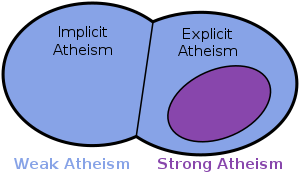I wonder if it would make sense to use the same language to describe atheists. To me, atheism has an extreme form. That would be pure materialism:
- That human religion and spirituality can be wholly reduced to psychology. All experiences of God, love, beauty, morality, miracles, etc. are just things the human brain creates. There is nothing supernatural out there that we are interacting with.
- Psychology can be wholly reduced to biology. Our brains are just bio-chemical machines. They do what they do. Outputs are wholly determined by inputs.
- Biology reduces to chemistry. There is no soul or anything non-material involved in the human person.
- Chemistry reduces to physics. That implies that there is no room for choices. We do what we do just like gravity does what it does. At our lowest level we are matter and every following the scientific laws matter and energy follows.
Anyway, the point is many atheists don't believe this pure form of atheism the eliminates not only God but any form of supernatural entity like virtue or beauty or purpose. Some claim to accept these 4 points but deny some obvious implications like nihilism or the loss of moral responsibility. Many assume widely-accepted Christian ideas they like will continue to be widely accepted. So atheists vary from pure atheism. It is a little like Catholics vary from pure Catholicism.
So that is why I am wondering if calling them liberal atheists makes sense. They are influenced by atheism but in an inconsistent way. More orthodox atheists will point out that they are picking and choosing. We can have cafeteria atheists like we have cafeteria Catholics.
It is not perfect because both atheism and Catholicism have influence even with people who would be insulted at the suggestion. Some liberal Catholics are also subconscious atheists. They think with anti-supernatural assumptions. Some protestants would see Catholicism as an evil ideology but the still think like certain truths are revealed by God and should be accepted as infallible. So language gets hard.
Bl John Henry Newman saw Catholicism and Atheism as the poles and various forms of protestantism and secularism in the middle. He thought compromise was inherently illogical. The deeper you thought the more you would drift to one pole or the other.

No comments:
Post a Comment